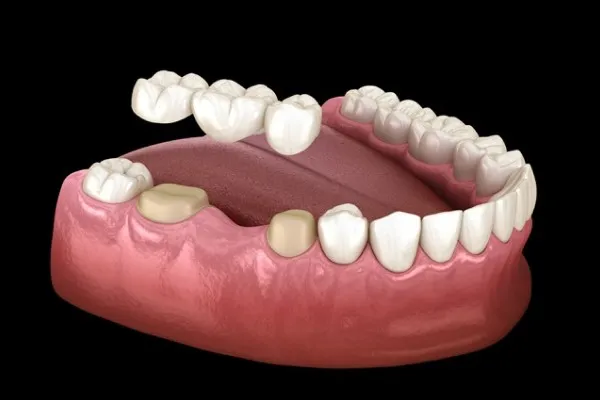We're located in the heart of Farmington Hills, Michigan
M-F 8:00 AM - 6:00 PM, S: 8:00 AM - 5:00 PM, Sun: Closed
Dental Crowns and Dental Bridges

Understanding the Roles of Dental Crowns and Bridges
Crowns and bridges are vital restorative treatments in dental care, offering both functional and aesthetic improvements for your smile. These restorations play distinct yet equally important roles, each enhancing the health and appearance of your teeth in its own way. Let’s explore their individual functions and the benefits they provide for your oral health.
Crowns
As teeth age, they can become more prone to issues like decay, cracks, or discoloration. Crowns are used to restore both the appearance and function of a weakened tooth. They are often used alongside root canal therapy, dental implants, or as anchors for bridges.
Crowns are usually crafted from porcelain to ensure both durability and a natural look. The process of placing a crown generally requires 2-3 office visits. After treatment, maintaining good at-home care and keeping regular dental check-ups will help your crown last for many years.
Bridges
A dental bridge is designed to replace missing teeth by using the neighboring teeth as anchors. These adjacent teeth may be crowned to support the bridge, which fills the gap left by the missing tooth or teeth. Replacing missing teeth is crucial to prevent surrounding teeth from shifting, which can lead to bite misalignment, TMJ issues, and other problems.
Dental bridges are custom-made to match the color and appearance of your natural teeth. They are constructed from materials such as gold, metal alloys, or porcelain to ensure strength and durability. With proper at-home care and regular professional maintenance, your dental bridge can last for many years.
The Importance of Addressing Broken and Missing Teeth
Discomfort while chewing with missing or damaged teeth arises from the complex function of our dental structure. Each tooth has a specific role, and when one is missing, the surrounding teeth must endure extra strain, leading to increased wear and tear. This added pressure can also affect the jaw joint, potentially causing issues such as teeth grinding and TMJ disorders.
Promptly addressing these issues is crucial for maintaining optimal oral health. Ignoring a broken or decayed tooth can lead to further deterioration and more extensive treatments in the future. Similarly, not replacing a missing tooth can result in jawbone loss over time, increasing the risk of additional tooth loss and contributing to premature aging of the teeth.
To protect your long-term oral health and maintain a youthful smile, it's important to address broken and missing teeth as soon as possible.
Dental Crowns and Bridges FAQs
How long do dental crowns last?
Dental crowns can last anywhere from 5 to 15 years or more, depending on the material used and how well you take care of your teeth.
Can I eat normally with a dental crown?
Yes, you can eat normally with a dental crown. However, it’s best to avoid chewing on hard or sticky foods that could damage the crown.
Are there any alternatives to dental crowns?
Absolutely! Regular professional teeth cleanings remove plaque, tartar, and bacteria that cause bad breath. Additionally, cleaning your tongue and ensuring there are no food particles or debris stuck between your teeth will significantly improve your breath.
NEW PATIENTS AND EMERGENCY
APPOINTMENTS WELCOME
TESTIMONIALS
WHAT OTHERS ARE SAYING

